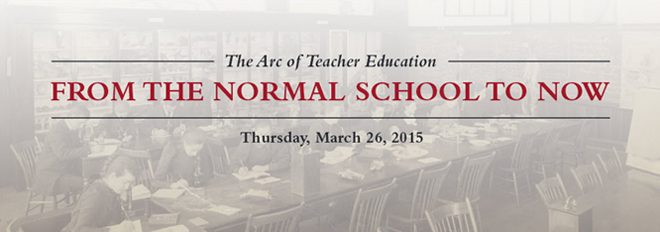Presentation Title
The "Great Experiment" and the Transformation of the Michigan State Normal School
Session Name
Concurrent Session 4. Social Forces and the Shaping of Late 19th Century Normal Schools
Start Date
26-3-2015 2:00 PM
End Date
26-3-2015 3:30 PM
Abstract
Of the normal schools that existed in 1910, 180 would evolve into state colleges or universities. One of these, the Michigan State Normal School (MSNS), founded in 1849, would be the first such school outside the original 13 colonies, the fifth normal school in the country, and the first to offer a four-year curriculum leading to a bachelor’s degree. This essay examines the transition of MSNS from a quasi-secondary school into a college-level institution. The conflict that unfolded in 1878 with the beginning of what became known as “the Great Experiment” and ended with the dismissal of Charles Bellows in 1890 provides an opportunity to examine the institutional, political, and social forces that shaped the transition. The legacy of this transition suggests that the forces which directed the transformation of MSNS were not driven by a desire to improve the quality of teacher education; rather, they served to undermine the potential of a single purpose institution in the pursuit of self-interest. Using primary source documents, the presentation of this paper will engage the audience in a contextualization of the events that led to the transformation of MSNS into a four-year college.
Included in
The "Great Experiment" and the Transformation of the Michigan State Normal School
Of the normal schools that existed in 1910, 180 would evolve into state colleges or universities. One of these, the Michigan State Normal School (MSNS), founded in 1849, would be the first such school outside the original 13 colonies, the fifth normal school in the country, and the first to offer a four-year curriculum leading to a bachelor’s degree. This essay examines the transition of MSNS from a quasi-secondary school into a college-level institution. The conflict that unfolded in 1878 with the beginning of what became known as “the Great Experiment” and ended with the dismissal of Charles Bellows in 1890 provides an opportunity to examine the institutional, political, and social forces that shaped the transition. The legacy of this transition suggests that the forces which directed the transformation of MSNS were not driven by a desire to improve the quality of teacher education; rather, they served to undermine the potential of a single purpose institution in the pursuit of self-interest. Using primary source documents, the presentation of this paper will engage the audience in a contextualization of the events that led to the transformation of MSNS into a four-year college.
